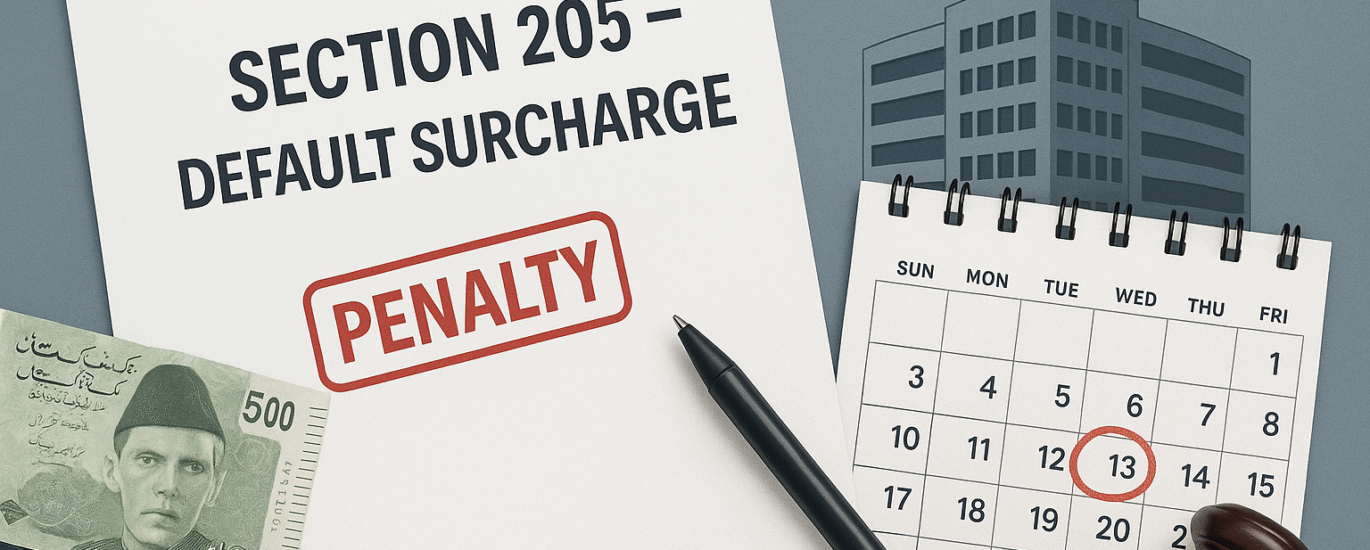The Income Tax Ordinance, 2001, outlines comprehensive provisions to ensure timely payment of taxes in Pakistan. Section 205 specifically addresses the imposition of a default surcharge, a form of penal interest levied on taxpayers who fail to meet their payment obligations within the prescribed time. This section plays a crucial role in reinforcing fiscal discipline and deterring non-compliance.
Let us explore the legal implications, computation method, and practical impact of Section 205 on taxpayers.
What is Default Surcharge under Section 205?
Section 205 imposes a default surcharge on persons who fail to pay:
Any tax (excluding advance tax under section 147 in some cases),
Any penalty imposed under the Ordinance,
Any amount due under Section 140 or 141,
Any amount of tax that was required to be deducted or collected but not paid timely.
The surcharge is computed based on the amount unpaid and the period of delay.
Rate of Default Surcharge
The applicable rate is:
Twelve percent (12%) per annum or KIBOR plus 3% per annum, whichever is higher.
This surcharge is calculated for the duration from the due date to the date of actual payment.
Key Subsections Explained
Subsection (1): General Default
If a taxpayer fails to pay tax, penalty, or any amount under Sections 140 or 141, the surcharge applies from the due date until payment is made.
Relief Clause:
If a person opts to pay tax as per the order under Section 129 without filing an appeal, no surcharge applies for the intervening period.
Subsection (1A): Non-payment of Advance Tax (Section 147)
If advance tax is not paid under Section 147, a default surcharge is levied from the due date until the date of payment or the due date for return filing, whichever is earlier.
Subsection (1B): Short Payment of Advance Tax
If tax paid under Section 147(4A) or (6) is less than 90% of the actual tax liability:
A surcharge is imposed on the shortfall.
Computed from April 1st to the date of assessment or June 30th of the next financial year, whichever is earlier.
Special Tax Year Clause:
In case of a special tax year, the period starts from the first day of the fourth quarter of that year.
Subsection (2): Refund of Surcharge
If the tax, penalty, or amount upon which the surcharge was based is later held to be not payable, the surcharge is refunded accordingly.
Subsection (3): Failure to Deduct or Collect Tax
If a person fails to:
Deduct tax under Division III of Part V or Chapter XII, or
Collect tax under Division II of Part V or Chapter XII,
Or fails to deposit the deducted/collected amount under Section 160,
Then surcharge applies from the date the tax was required to be deducted or collected until it is paid.
Relief:
Same relief applies as mentioned in subsection (1) if the tax is paid under an order without filing an appeal.
Subsections (5), (6), and (7): Assessment of Surcharge
The Commissioner assesses default surcharge like any tax.
Part II procedures apply.
The Commissioner may assess the surcharge even if the actual tax has not been paid, at his discretion.
Importance of Section 205 for Taxpayers
Section 205 acts as a deterrent against tax default. Its implications are significant:
Encourages timely tax payments.
Imposes financial consequences for delays.
Holds withholding agents and payers accountable.
Ensures revenue protection for the government.
Failure to consider these provisions can lead to additional financial burden and legal complications.
20 Frequently Asked Questions (FAQs)
Q1: What is default surcharge in Pakistani tax law?
A: It’s a penal charge imposed for late payment of tax, penalty, or other dues under Section 205 of the Income Tax Ordinance, 2001.
Q2: What is the current rate of default surcharge?
A: 12% per annum or KIBOR + 3% per annum, whichever is higher.
Q3: Is surcharge applicable on late payment of advance tax?
A: Yes, under subsections (1A) and (1B) of Section 205.
Q4: Can surcharge be refunded?
A: Yes, if the related tax or penalty is later deemed not payable.
Q5: Is surcharge applicable if an appeal is filed?
A: No surcharge applies if the taxpayer accepts the order under Section 129 and does not appeal under Section 131.
Q6: What is the calculation period for default surcharge?
A: From the due date to the date of actual payment.
Q7: Does surcharge apply to withholding agents?
A: Yes, for failure to deduct, collect, or deposit tax under Section 160.
Q8: Can the Commissioner assess surcharge even if tax is unpaid?
A: Yes, under subsection (7).
Q9: Is KIBOR applicable in surcharge calculation?
A: Yes, if it exceeds 12%, then KIBOR + 3% is used.
Q10: What happens if less than 90% of advance tax is paid?
A: Surcharge is levied on the shortfall.
Q11: Is there relief for special tax year filers?
A: Yes, with a modified surcharge calculation period.
Q12: Who is liable to pay default surcharge?
A: Any taxpayer or withholding agent who fails in payment obligations.
Q13: Can default surcharge be waived?
A: Only under specific statutory relief conditions; otherwise, it is mandatory.
Q14: Does default surcharge apply to voluntary tax payments?
A: No, it applies only when there’s a delay or shortfall.
Q15: Can surcharge be compounded?
A: No, it is computed linearly based on time and amount.
Q16: Is there a cap on default surcharge?
A: No express cap; it depends on duration and amount.
Q17: How is KIBOR rate determined?
A: It is based on prevailing interbank rates, notified by SBP.
Q18: What documents are needed to calculate surcharge?
A: Payment records, tax orders, assessment notices.
Q19: Does surcharge apply to sales tax?
A: No, Section 205 applies only to income tax under the Ordinance.
Q20: Where is surcharge shown in tax returns?
A: It’s reflected in the liability section or assessment orders issued by FBR.
Section 205 is an enforcement tool in Pakistan’s income tax regime. It ensures that both individual taxpayers and withholding agents fulfill their legal duties in a timely manner. Ignoring these provisions can result in unnecessary financial penalties. Therefore, understanding and complying with Section 205 is essential for lawful and responsible tax practice.






